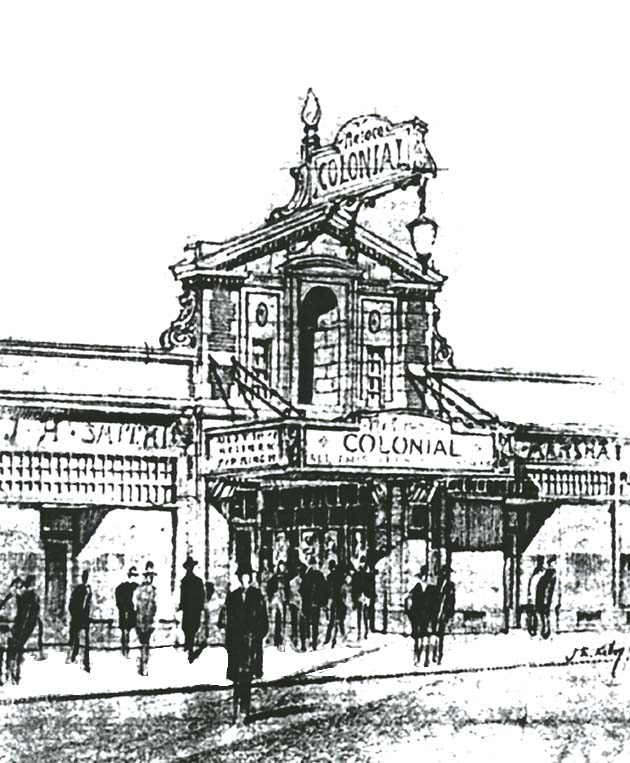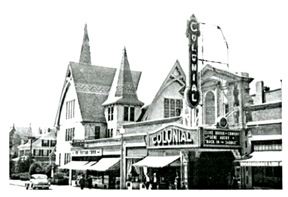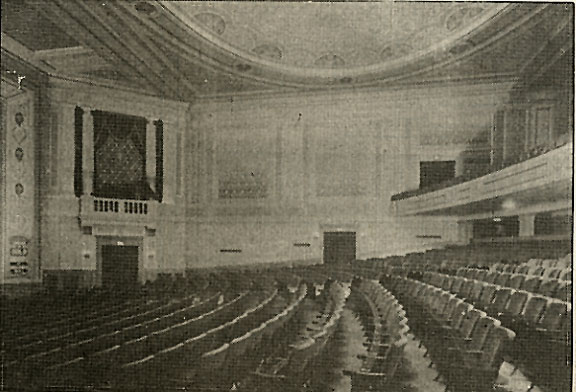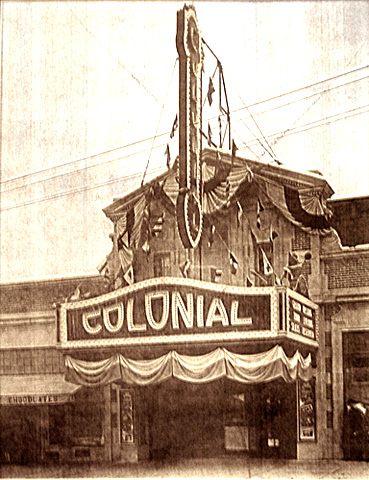|
From the Natick Bulletin dated
December 6, 1929, the story of the grand opening of the Colonial Theatre.
The opening of the New Netoco Colonial Theatre on Wednesday was the greatest event that has occurred in this town for a decade and an audience of over 1500, town officials, professional and business men were, unanimous in their admiration of the beautiful structure which far exceeded the expectations any one had conceived and the large audience was thrilled at the exceptional program prepared on the opening night. Adolph Le Cour was the guest organist and his selections were well selected and the most critical music lover could not have asked for a finer program.
The news reels were up-to-date and the picture of "Then and Now" touched on the Colonial atmosphere so appropriate for the opening, and made a decided hit in its delineation of old time society events compared with the modern day. The color picture a Japanese fantasy also was most appropriate.

In the feature picture the management scored a triumph for their was nothing that could prove more entertaining than the greatness of George Arliss in "Disraili".
Between the pictures a brief time was allotted to representatives of the town's interests, to welcome the new enterprise.
Martin T. Hall, Esq., was Master of Ceremonies and presided in his usual graceful manner. He paid high tribute to Fred L. Harris, who first planned the theatre, to his wife, who had taken up the task at his death and to the New England Theatre Operating Co. for making its success possible. Mr. Hall's opening remarks found a ready response in the large audience.
Fred J. Lucey, Principal Assessor, and for many years a personal friend of Fred L. Harris, spoke for the town government. Mr. Lucey said,
"We have assembled here in this beautiful theatre with feelings of appreciation for
those whose confidence in Natick and its future have given us this beautiful home for entertainment. We can assure them that we are hearty in our expression of co-operation and extend to the owners and the management a warm welcome.
"This beautiful theatre is dedicated for the purpose oŁ, interesting, instructing, amusing, and bringing our people in touch with the news of the world. ]
"We expect certain things from the management. They expect certain things from us. We expect a clean presentation of entertainment. We guarantee our support.
"When our people learned that the New Theatre Operating Corporation known as the "Netoco" people were to operate this Beautiful theatre, we were satisfied that we would be behind their efforts for we know of their reputation for honesty and consideration for their patrons and let me assure them on behalf of the town that we pledge them our hearty support.
"Permit me to say, my fellow citizens, and to you our good friends, who are to operate this home of endeavor, that we of Natick believe this to be a memorial to one of our dearest friends and fellow citizens. We Natick people shall always think of this as not 'quite the wish of Fred Harris, for the wish of this artist could not be fulfilled, or reproduced. His wish for Natick, as I well know, was along the lines that Mr. Lourie of the Netoco well knows.
"He was Natick's idea of the clean minded, upstanding man and a lover of music, drama and the arts. We deplore his early taking away. If we of _Natick cannot give Fred Harris a
memorial, let this be the nearest thing to it. We regret he cannot be here tonight to receive our thanks for his generous contribution to Natick's civic life. The regard Natick has had for Fred Harris has been transferred to his good wife. We who have been his friends admire her qualities know her
capacity and transfer our admiration
from him to her. On behalf of the Town of Natick, I extend a welcome and wish for success to Mrs. Harris and the Netoco organization.
John H Craig, President of the Natick Commercial Club extended the greetings of the mercantile and manufacturers of the community. He said in part:
"On behalf of the Business Men Of Natick, I congratulate Mrs. Harris and her Associates for building such a beautiful building in our town;
We as business men are proud of it and proud of the fact that you have such confidence in our Town to erect such a building. 
We who listened in on the radio heard some very nice things being said about this beautiful building and about our Town. As business men we consider that very good advertising telling the people about the good things Natick has to offer. Our businessmen here at Natick are bound to get a benefit from this magnificent Theatre. The Town of Natick will
also be the gainer in increasing the valuation of our Town. This building is in keeping with the other buildings here at Natick. We here in Natick are proud of our churches, our schools, our hospital and all
of our public and privately owned buildings. Only recently the owners of Clark's Block
spent about $65,OOO in bringing the
show windows of that building up to date and is second to_ none of any city or town of our size in the State. We are proud of our schools also. Do you know that we have a private school for girls that is way
ahead of any school of its kind in New England? I refer to the Walnut Hill School. They are now building a gymnasium that will cost about $100,000 which will be completed next Spring.
We have one of the best Junior High Schools of any Town of size in the State. A school is now being built by Father Delaney which will be completed in the very near future. Some of us hope that a Memorial building will be built by the Town in the near future.
So you see ladies and gentleman the confidence that Mrs. Harris and her associates have in Natick is bound to be followed by others. What Natick needs more than ever before is that every man, woman and child in our town boost for Natick. And to Mrs. Harris and her associates, the business men of Natick wish you continued success.
George C. Fairbanks was introduced by Mr. Hall as the oldest business man in Natick and one of the oldest editors in the State, who would bring the greetings of the press to the new theatre owners. He said in part:
"Three score years in the mercantile field and nearly half a century publisher of your home newspaper, it is my rare privilege to tender the greetings of this community and to extend congratulations to this wonderful amusement enterprise.
"Unsurpassed in beauty, with appointments complete even to the minutest detail, no town has its equal and few cities its superior. It is one of the finest of the Netoco chain.

Colonial is a most fitting name for a theatre in this town so rich in historic lore. Natick was the choice of the Apostle John Eliot for his labors in Christianizing the Indians. The
farmer boy who came from the shoe-Hampshire Hills, learned the shoe-making trade here and afterwards became Vice President of the United States, selected Natick for his homeland and lived here until his death. Harriet Beecher Stowe, authoress of Uncle Tom's Cabin, which aroused the Nation to the evils of slavery and contributed to its abolishment, lived in Natick, and her "Oldtown Folks" portrayed the life of the town and characters were real persons living here.
Natick is conceded to have produced more famous athletes than any other community in the United States.
"To those achievements is now added the possession of he finest theatre of any town in the state.
"We have reason to be justly proud of this beautiful theatre which comes to us through the enterprise of the Netoco Corporation and we owe them our heartiest endeavors to maintain the highest standard of excellence. While acknowledging this great debt to the present
promoters, we should not overlook the one who laid the foundation for this beautiful structure. Fourteen years he catered to the amusement public, giving the best attainable. Realizing with the rapid growth of the industry that Natick should have a new theatre he purchased this site upon which this theatre stands, but while plans of a building were being prepared he was stricken with a serious illness which proved fatal. With courage seldom equaled the work was taken up by his wife and with the assistance of the Netoco Corporation was pushed to a
successful completion.
Honor to Mrs. Harris, and too much praise cannot be given to her associates for this beautiful theatre, but in our rejoicing let us not forget him whose vision pointed the way and always hold in grateful remembrance Fred L. Harris.
Samuel Pinanski, President of the New England Theatre Operating Company, expressed the pleasure which it gave his organization to bring to Natick one of their theatres. He expressed his
appreciation to the townspeople and to the architect, contractor, building inspectors, and police department for the co-operation he had received since building operations were started. It was the aim of the Company to give to the people the best offered in the amusement world, and Netoco, as an independent organization, not affiliated with any one film company was in a position to buy the best of a pictures and present them to their audiences. During the year about four hundred feature pictures were purchased by the Netoco of which two hundred would be shown in Natick giving the people an opportunity to see and hear the best. The Netoco was operated by family men and it was the
endeavor of the Company to give pictures which their children could see and they took the same attitude toward the children of their patrons.
Natick would find no offensive programs offered by them. He extended a cordial invitation to the townspeople to inspect the theatre,
and its equipment which was unsurpassed in any house.
The latest improved screen extending the full width of the stage was
the most modern and adapted to the modern projections. The projection room was equipped with the latest Western Electric sound projectors and movietone
equipment.
The New Colonial Theatre 
The Netoco Colonial, designed by one of the country's leading architects, John Edmund Kelley, of Boston, seats 1600 persons with 1000 in the orchestra and 500 in the balcony, and is entered from the vestibule through a spacious ticket office lobby, and a generous foyer. From the foyer a broad flight of stairs lead to the balcony
on either side, so constructed as to be exceptionally easy of ascension and off this same foyer are grouped the ladies' rooms, the men's rooms, the manager's office and coat room. The main auditorium is entered thru two large doorways to a circulation space, or promenade, at the rear of the seating area which is also the passageway to and from the aisles in the orchestra seats.
The front of the building is one story in height and is done in Colonial style, treated in Indiana limestone, granite and red brick.' The main entrance is 20 feet wide and is protected by a broad marquise, studded with lights on the underside and supporting the large display signs. From the roof of the marquise, the front of the building with its deep nitch
will be brilliantly illuminated with series of flood lights, making an artistic and attractive composition and a brilliant welcome to the Colonial patrons.
The outer vestibule is also in the colonial style, with a richly ornamental ceiling and marble walls. Built into the wall on either side are bulletin boards for the display of attractions.
The spacing of seats, greater from back to back than required by the Department of Public Safety of Massachusetts, gives ample space for leg room and ease of success to all seats in a row. So generous is the seating space that 300 additional seats might be had if the operators wished to reduce the space per seat to the requirements of the law. The chairs will be of the most comfortable design with leather upholstered back and air
cushion seats.
The ventilating system is of the typhoon type which is capable of delivering 160,000 cubic feet of air per minute into the auditorium for summer ventilation and cooling.
The lights are so arranged that the house will be in a dim light during the screen or stage presentations, while at intermissions the auditorium and lobbies will be brilliantly illuminated. An emergency lighting system will be provided that will automatically supply light and current with which the motion pictures may complete the show in the event that the electric current is shut off.
The stage is equipped with all the needs for any dramatic production. It is 28 feet deep and capable of presenting any of the big Broadway shows. The projection booth, wherein are installed the very latest models of machines, through the medium of which may be thrown upon the screen the various types of sound pictures, is situated
directly in the rear of the balcony and is completely insulated with fire-proof and protecting the rest of the theatre from conflagration in the very remote possibility that a film should become ignited.
It is of no little importance to the public to note that aggress, or exits from both orchestra enclosures and balcony are ample, easy and far in excess of requirements of the Dept. of Public Safety. The floors of the vestibule and lobby are of rich-marble terrazzo, with polished brass strips and polished base.
The foyer is irregular in plan with nooks for the accommodation of waiting groups. The walls are
paneled and treated in rich colors of buff and gold with a rich carpeted floor, which same material leads up to the balcony at each end of the foyer and also into the auditorium. The ladies room and lounge is of a domestic scale, with soft jade green window hangings to perfect a perfect harmony in keeping with the rest of the enclosure, which includes a rug-covered floor, comfortable furniture and ample mirrors.
The men's room is attractively decorated in practical colors, with substantial furniture and marble terrazzo floor and base.
The auditorium is after the same colonial style of architecture and is especially artistic and
beautiful, with richly decorated dome ceiling and heavy cornice. The walls are
paneled with brocaded damask and arabesque and painted in rich green, gray, gold and color leading to the screen motif on each side which is flanked by fluted columns and
plastered and draped with heavy maroon velour draperies, bordered in gold.
Not the least of the modern developments which will add greatly to the attractiveness, insofar as service is concerned
at least, is the large automobile parking space which surrounds the theatre. This will be presided over by a uniformed attendant and will guarantee the safety of automobiles while the owners are attending the performance.
The Final Days of the
Colonial |
|
|



